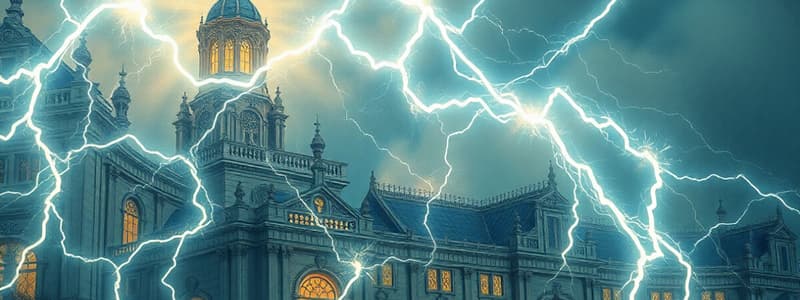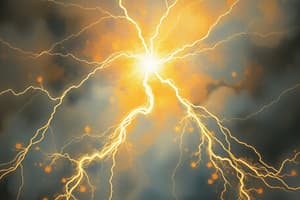Podcast
Questions and Answers
What are the two destructive natural phenomena discussed in this chapter?
What are the two destructive natural phenomena discussed in this chapter?
Lightning and earthquakes
Lightning and sparks from clothes are the same phenomena.
Lightning and sparks from clothes are the same phenomena.
True (A)
What was the ancient misconception about lightning?
What was the ancient misconception about lightning?
- It could be controlled by humans.
- It was a harmless phenomenon.
- It was a result of natural processes.
- It was caused by the wrath of gods. (correct)
Who showed that lightning is caused by the accumulation of charges in clouds?
Who showed that lightning is caused by the accumulation of charges in clouds?
The ancient Greeks knew about electric charges as early as _____ B.C.
The ancient Greeks knew about electric charges as early as _____ B.C.
What happens when a plastic scale is rubbed on dry hair?
What happens when a plastic scale is rubbed on dry hair?
What type of objects are referred to as charged objects?
What type of objects are referred to as charged objects?
Match the following objects with the materials used for rubbing:
Match the following objects with the materials used for rubbing:
Flashcards are hidden until you start studying
Study Notes
Lightning
- Lightning is a large electric spark caused by the accumulation of charges in clouds.
- People used to think lightning was caused by angry gods, but now we understand it as a natural phenomenon.
- Benjamin Franklin discovered the link between lightning and the sparks from everyday objects in 1752.
Charging by Rubbing
- Rubbing certain materials together, like a plastic refill with polythene, creates static electric charge.
- When materials are rubbed, they acquire a charge, which can attract light objects like paper.
- Charged objects attract or repel each other depending on the type of charge they have.
- Several everyday objects can be charged by rubbing them against another material.
- Different objects respond differently when rubbed with various materials, some become charged and some don't.
Types of Charges and Their Interaction
- Objects can be given opposite charges (positive and negative), just like lightning.
- When a charged refill is brought near another charged refill, they will either attract or repel each other.
- The behaviour of charged objects can be used to identify the type of charge they possess.
- The attraction or repulsion between charged objects depends on the type and amount of charges they carry.
Studying That Suits You
Use AI to generate personalized quizzes and flashcards to suit your learning preferences.




